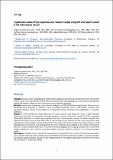Files in this item
A systematic review of the supportive care needs of people living with and beyond cancer of the colon and/or rectum
Item metadata
| dc.contributor.author | Kotronoulas, Grigorios | |
| dc.contributor.author | Papadopoulou, Constantina | |
| dc.contributor.author | Cunningham, Kathryn | |
| dc.contributor.author | Simpson, Mhairi | |
| dc.contributor.author | Maguire, Roma | |
| dc.date.accessioned | 2018-05-30T23:32:55Z | |
| dc.date.available | 2018-05-30T23:32:55Z | |
| dc.date.issued | 2017-08 | |
| dc.identifier | 250889936 | |
| dc.identifier | 18f8ce6e-3a7a-4143-8e5e-350685abcc81 | |
| dc.identifier | 85020018264 | |
| dc.identifier.citation | Kotronoulas , G , Papadopoulou , C , Cunningham , K , Simpson , M & Maguire , R 2017 , ' A systematic review of the supportive care needs of people living with and beyond cancer of the colon and/or rectum ' , European Journal of Oncology Nursing , vol. 29 , pp. 60-70 . https://doi.org/10.1016/j.ejon.2017.05.004 | en |
| dc.identifier.issn | 1462-3889 | |
| dc.identifier.other | Bibtex: urn:8914b957c11ee8b3bcfe68ab4cc91ff8 | |
| dc.identifier.uri | https://hdl.handle.net/10023/13630 | |
| dc.description | Funding: NHS Lanarkshire (MS13312). | en |
| dc.description.abstract | Purpose: Gaining a clear understanding of the health needs and concerns of people with cancer of the colon and/or rectum can help identify ways to offer a comprehensive care package. Our aim was to systematically assess the relevant literature and synthesise current available evidence. Methods: A systematic review was conducted according to the PRISMA Statement guidelines. Five electronic databases were searched to identify studies employing qualitative and/or quantitative methods. Pre-specified selection criteria were applied to all retrieved records. Findings were integrated in a narrative synthesis. Results: Of 3709 references initially retrieved, 54 unique studies were retained. A total of 136 individual needs were identified and classified into eight domains. Just over half of the needs (70; 51%) concerned information/education or health system/patient-clinician communication issues. Emotional support and reassurance when trying to deal with fear of cancer recurrence featured as the most prominent need regardless of clinical stage or phase of treatment. Information about diet/nutrition and about long-term self-management of symptoms and complications at home; tackling issues relating to the quality and mode of delivery of health-related information; help with controlling fatigue; and on-going contact with a trustworthy health professional also featured as salient needs. Available research evidence is of moderate-to-good quality. Conclusions: Investing time to sensitively inquire about the supportive care needs of this patient population is key, whilst evaluating and re-shaping clinical interactions based on patients’ priorities is equally essential. The diverse needs identified require a multi-professional and multi-agency approach to ensure unmet needs are addressed or measures offered. | |
| dc.format.extent | 11 | |
| dc.format.extent | 663340 | |
| dc.language.iso | eng | |
| dc.relation.ispartof | European Journal of Oncology Nursing | en |
| dc.subject | Supportive care | en |
| dc.subject | Supportive care needs | en |
| dc.subject | Colorectal cancer | en |
| dc.subject | Colon cancer | en |
| dc.subject | Rectum cancer | en |
| dc.subject | Unmet needs | en |
| dc.subject | Patient-centred care | en |
| dc.subject | Patient-reported outcomes | en |
| dc.subject | Systematic review | en |
| dc.subject | H Social Sciences | en |
| dc.subject | RC0254 Neoplasms. Tumors. Oncology (including Cancer) | en |
| dc.subject | SDG 3 - Good Health and Well-being | en |
| dc.subject.lcc | H | en |
| dc.subject.lcc | RC0254 | en |
| dc.title | A systematic review of the supportive care needs of people living with and beyond cancer of the colon and/or rectum | en |
| dc.type | Journal item | en |
| dc.contributor.institution | University of St Andrews. School of Medicine | en |
| dc.contributor.institution | University of St Andrews. Population and Behavioural Science Division | en |
| dc.identifier.doi | https://doi.org/10.1016/j.ejon.2017.05.004 | |
| dc.description.status | Peer reviewed | en |
| dc.date.embargoedUntil | 2018-05-30 |
This item appears in the following Collection(s)
Items in the St Andrews Research Repository are protected by copyright, with all rights reserved, unless otherwise indicated.

